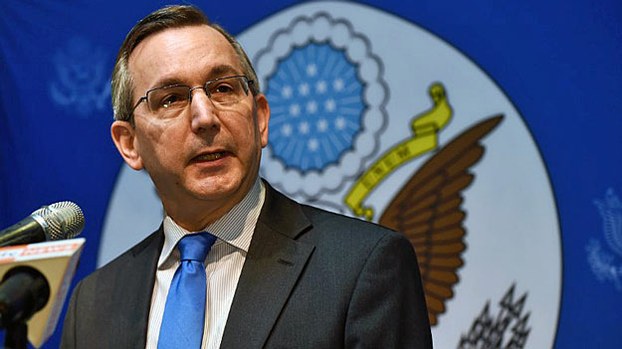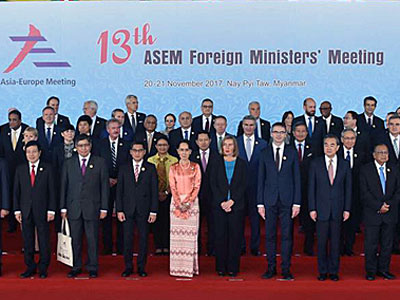




The U.S. ambassador to Myanmar met with NGOs and Rakhine state’s dominant ethnic political party to discuss recent violence that has wracked the region, as more than 50 foreign ministers from various countries and regional groups gathered for a meeting in the capital Naypyidaw on Monday.
American Ambassador Scot Marciel and visiting U.S. congressmen on a fact-finding mission met with leaders of the Arakan National Party (ANP) in Rakhine’s capital Sittwe, days after U.S. secretary of State Rex Tillerson visited the country and met with de facto leader Aung San Suu Kyi and military commander-in-chief Senior General Min Aung Hlaing to discuss the crisis in Rakhine.
More than 615,000 Rohingya Muslims have fled to southeastern Bangladesh from northern Rakhine state during a brutal crackdown by Myanmar security forces following deadly Aug. 25 attacks on police outposts by the Muslim militant group the Arakan Rohingya Salvation Army (ARSA).
Many of the refugees have accused soldiers of indiscriminate killings, arson, torture, and rape, though both the military and Myanmar’s civilian-led government have consistently denied the allegations without allowing independent observers into the region.
During a visit to Myanmar on Nov. 15, Tillerson expressed concern over “credible reports” of atrocities committed by Myanmar military forces, but said that new sanctions against the Southeast Asian country would not resolve the crisis.
Marciel and the others said they had found evidence of ethnic cleansing during a visit to Bangladesh which they would present to the White House upon their return to the U.S., according to those who attended the meetings.
The ANP, which represents the interests of ethnic Rakhine people who live in the state and in the Yangon region, told Marciel and the congressmen that Muslims fled en masse to Bangladesh in order to use international pressure on Myanmar to their advantage to establish a new territory on Rakhine soil, which ethnic Rakhine people, most of whom are Buddhists, find unacceptable.
ANP General Secretary Tun Aung Gyaw said political party members cautioned the Americans that use of the term “Rohingya” would make the situation in northern Rakhine worse.
Myanmar views the Rohingya as illegal immigrants from Bangladesh and refers to them as “Bengalis.”
“The term Rohingya is not accepted by people in Myanmar,” he said. “We told them that using the term that is disliked by Rakhines and other ethnics would exacerbate the situation there, that Western nations and international groups alike should understand this and use a neutral term. However, they did not accept our explanation.”
Tun Aung Gyaw said ANP members told Marciel and the American politicians that they should think about Myanmar’s Constitution and acknowledge that there are issues other than human rights in Rakhine.
“There has been a lot of violence in our state, and many of us Rakhines have suffered greatly,” he said. “But when authorities tried to find solutions, we never had a chance to take part or have a say. It’s important the authorities come down to meet people to understand their situations and sentiments."
A question of numbers
Zaw Zaw Tun, secretary of the REC Rakhine Ethnics Organization in Sittwe who attended the meetings, told RFA’s Myanmar Service he had raised questions with Marciel about the accuracy of the number of Rohingya who have fled northern Rakhine.
“International groups and countries who focus on human rights are now putting pressure on our government because they believe 600,000 Muslims have fled to the other side,” he said. “But we don’t know if the numbers really are 600,000 or not.”
He said “there are many things to consider” because Muslims from Buthidaung and Rathidaung townships in northern Rakhine, which he asserted were not affected by the violence, are still fleeing to Bangladesh.
Northern Rakhine’s Maungdaw, Buthidaung, and Rathedaung townships were at the epicenter of the recent military crackdown and violence in the region.
“Muslims in these areas are getting fake news that they will be targeted and that they have no security here and will have better lives on the other side,” Zaw Zaw Tun said without elaborating.
“We also pointed out that the victims included many Rakhines, Hindus, and other ethnics,” he said. “They [the ethnic peoples] said they could not accept any kind of violence or killings, and that they are always ready to help all those who have suffered.”
Earlier, Marciel and the U.S. Congressmen had separate talks with representatives from local NGOs and members of the Muslim community in Sittwe.

Marciel’s visit came as Myanmar opened a meeting for foreign ministers from 51 countries and regional organizations, including representatives from the Association of Southeast Asian Nations (ASEAN) and the European Commission, in the capital Naypyidaw.
Federica Mogherini, the EU’s chief of foreign affairs and security policy and vice president of the European Commission, told the media that talks with de facto national leader Aung San Suu Kyi over the planned repatriation of Rohingya Muslim refugees who have fled to Bangladesh were “encouraging.”
“I am very much encouraged by the possibility” of Myanmar and Bangladesh reaching an agreement on the return of Rohingya refugees. Though the two countries have agreed in principle to the repatriation of the Rohngya, they are still negotiating an actual deal.
Her comment comes as a rare vote of confidence in Myanmar’s willingness to remedy the Rohingya crisis, despite widespread international criticism and condemnations of Aung San Suu Kyi for failing to address the issue.
On Monday, Agence France-Presse reported that China said that Myanmar and Bangladesh are backing a “three-phase” plan it recently proposed to resolve the Rohingya crisis.
China’s Foreign Minister Wang Yi presented the plan, which involves a cease-fire, the repatriation of refugees, and long-term poverty alleviation measures, during visits to Bangladesh last week and Myanmar this weekend. It isn’t clear, however, what role China would play.
Myanmar’s largest trading partner and foreign investor, China has invested billions of dollars in dual oil and natural gas pipelines and a deep-sea port project in the town of Kyaukphyu in western Rakhine state.
Earlier this month China spared Myanmar from a U.N. Security Council resolution that, if passed, would have condemned the violence in Myanmar’s northern Rakhine. Instead, the Council issued a statement calling on the government to end the use of excessive military force and the intercommunal violence that has devastated the Rohingya community in northern Rakhine.
Reported by Min Thein Aung for RFA’s Myanmar Service. Translated by Khin Maung Nyane. Written in English by Roseanne Gerin.